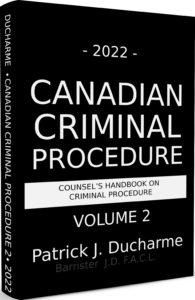 |
| Patrick Ducharme |
When the Rules of Evidence and Procedure May Be Relaxed – In Aid of A Beleaguered Accused
The Supreme Court of Canada in Spence1 established that technical, procedural requirements would be trumped, if required, in order to ensure fairness and the appearance of fairness from the perspective of the accused, which the court determined to be the primary factor. Additionally, in Lyttle2 the Supreme Court of Canada stated that just as the right of cross-examination itself is not absolute, so too are its limitations. Trial Judges enjoy, in this as in other aspects of the conduct of the trial, a broad discretion to ensure fairness and to see that Justice is done and “seen to be done”. This discretion to relax the rules of procedure has extended to relaxing the rule of relevancy, and, relaxing in favour of the accused a strict rule of evidence where it is necessary to prevent a miscarriage of justice or where the danger against which the exclusionary rule aims to safeguard does not exist.3
The right of an accused to cross-examine prosecution witnesses without significant and unwarranted constraint is an essential component of the right to make a full answer and defence. The right of cross-examination is protected by section 7 and subsection 11(d) of the Charter and must be jealously protected and broadly construed. A question can be put to a witness in cross-examination regarding matters that need not be proved independently, provided that counsel has a good faith basis for putting the question. It is not uncommon for counsel to believe what is in fact true without being able to prove it otherwise than by cross-examination.
A “good faith” basis is a function of the information available to the cross-examiner, his or her belief in its likely accuracy, and the purpose for which it is used. The information may fall short of admissible evidence and may be incomplete or uncertain, provided the cross-examiner does not put suggestions to the witness recklessly or that he or she knows to be false. The cross-examiner may pursue any hypothesis that is honestly advanced on the strength of a reasonable inference, experience or intuition, and, there is no requirement of an evidentiary foundation for every factual suggestion put to a witness in cross-examination.4
Where a question implies the existence of a disputed fact that is manifestly tenuous or suspect, a trial Judge may seek assurance that a good faith basis exists for the question. If the Judge is satisfied the question(s) is not otherwise prohibited, counsel should be permitted to put the question to the witness. In Lyttle the existence of a good faith basis for the defences’ “drug debt theory” had become apparent over the course of two voir dires. The trial Judge erred in law by requiring an evidentiary foundation for the cross-examination.
Our courts accept that at times there may be no other way than thorough cross-examination to expose a falsehood, to rectify error, to correct distortion or to elicit vital information that would otherwise remain forever concealed. That is why the Supreme Court of Canada in Lyttle suggested cross-examination of witnesses for the prosecution must take place without significant or unwarranted constraint. Cross-examination is such an essential component of the right to make full answer and defence it must remain unfettered. The only limitation on cross-examination is the requirement of good faith on the part of the cross-examiner in the suggestions made to a witness.
The trial Judge in Lyttle had prohibited cross-examination by the defence lawyer in areas where the defence lawyer was unable to provide “substantial evidence” of his drug debt theory. When defence counsel refused to give an undertaking to present an evidence-based foundation for the proposed cross-examination, the trial Judge refused to permit the cross-examination.
Both the Court of Appeal and the Supreme Court of Canada determined that the trial Judge had unduly restricted the right of the accused to conduct a full and proper cross-examination of the principle crown witness. As long as counsel has a good faith basis for asking an otherwise permissible question in cross-examination, the question should be allowed. No distinction need be made between expert and lay witnesses within the broad scope of this general principle.
In R. v. Varga5 the Crown on appeal argued the cross-examination of a complainant alleging sexual assault against a medical doctor related to matters that were of no, or marginal, relevance to the facts in issue or her credibility; and that the potential prejudice to the proceedings was much greater than any potential probative value inherent in the answers to these questions. The Crown argued that the potential prejudicial effect was substantially greater than any probative value, and thus, the trial Judge should not have allowed the cross-examination. Crown counsel also submitted that the entirety of the cross-examination of the complainant did not amount to a legitimate challenge to her credibility, but rather was an attempt at character assassination. The Court of Appeal for Ontario, in dismissing the Crown appeal, wrote:
This contention is also advanced for the first time on appeal. Defence counsel cross-examined the complainant at length concerning the contents of her psychiatric and treatment records. That cross-examination proceeded uninterrupted for some 65 pages of the transcript. When, after this lengthy cross-examination, Crown counsel did object, his objection related only to the cross-examination of the complainant on a specific reference to her psychiatric records. The objection was not a general one like that now advanced by the Crown. That particular objection was rejected by the trial Judge. The Crown made one further specific objection to the relevancy of the cross-examination on the records during the course of a 210-page cross-examination. That objection was also rejected. Crown counsel does not contend that either ruling in and of itself amounted to reversible error.
Assuming the discretion to exclude evidence proffered by the defence, referred to in Seaboyer, is applicable here, I cannot say that the trial Judge erred in not foreclosing cross- examination on the basis that its potential prejudicial effect far exceeded its probative value: He was never asked to do so by the Crown. A trial Judge is always reluctant to interfere with the cross-examination of a witness, particularly a crucial witness.
This trial Judge was entitled to rely on Crown counsel, who was aware of the issues and the contents of the documents, to challenge the cross-examination if its prejudicial potential clearly exceeded its probative value. Nor can I assume, as Crown counsel argues I should, that because the trial Judge rejected the specific objections made at trial, he would necessarily have rejected the argument now advanced had counsel seen fit to make it.6
The cross-examination of Ms. Waddell was detailed, vigorous, and confrontational. This is hardly surprising, given that it was the position of the defence that the entire allegation was a fabrication. Defence counsel was obliged, in the service of his client, to use every legitimate means available to him to challenge and undermine the credibility of the complainant. A consideration of the entirety of the cross-examination satisfies me that counsel did not, save perhaps in a few isolated instances, go beyond the bounds permitted by our adversarial process.7 [Emphasis Added]
The courts will, and arguably should, be reluctant to curtail legitimate cross-examination unless it is manifestly unfair.

The above is the an excerpt of Patrick J Ducharme's book, Canadian Criminal Procedure Volume 2, available at Amazon or in bulk through MedicaLegal Publishing along with Criminal Trial Strategies.
Subscribe to Patrick Ducharme's Youtube Channel
